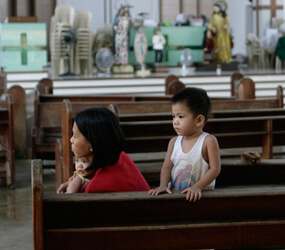MEXICO CITY – The Catholic aid agency Caritas has responded to the torrential downpours in Guatemala with appeals for food and clothing for the victims of what has been described as the heaviest rains to be dumped on the Central American country in more than 50 years.
A report issued Sept. 7 by Caritas Guatemala said the rains had left more than 14,000 people homeless and more than 40 people dead. Many of the dead were trapped in mudslides that buried vehicles and a bus traveling the Inter-American Highway. Subsequent mudslides later trapped rescue workers. The Caritas report said rescue efforts would resume only with machinery because of the risk of further mudslides.
The Caritas national office was working with local branches in various parts of the country “mainly to provide food,” said Fernanda Armas, a spokeswoman with Caritas Guatemala.
Susana Lopez, an organizer in the social affairs ministry of the Diocese of San Marcos, said the current precipitation followed the heavy rains brought by Tropical Storm Agatha earlier this year, which “left the soil saturated” and was causing additional damage.
A diocesan report provided to Catholic News Service Sept. 8 spoke of heavy crop damage, a lack of clean water and sanitation and a persistent risk of victims’ homes being looted. The situation was listed as desperate in some of the more isolated regions of the diocese.
“No help has arrived because water is covering the roads,” said Paola Orozco, relief coordinator for La Blanca parish in the community of Carrizales. She said many local residents lost their corn crops “because the water rose so quickly.”
Farther north in Mexico, heavy rains and Tropical Storm Hermine resulted in flooding along the Gulf Coast, while depressions in the Pacific provoked inundations in the states of Oaxaca and Chiapas.
Flooding in Mexico has affected 600,000 residents, the Red Cross reported.
Church volunteers in the state of Veracruz began converting parishes into shelters and providing meals in flood-afflicted areas, according to news reports.
Father Denis Ochoa Vidal, spokesman for the Diocese of Tabasco, said church officials were preparing to turn parishes into temporary shelters and that trained parish response teams had been mobilized to help those left homeless.
He said that some parishes had started removing art and religious items because of the risk of even more flooding, which some forecasts predict could leave much of the low-lying state of Tabasco under water and be worse than the 2007 rains that affected more than 1 million residents.
“We’re asking that these forecasts are wrong and that the Lord has mercy and diverts the water,” Father Ochoa said, adding the diocese had started a “campaign of prayer.”


